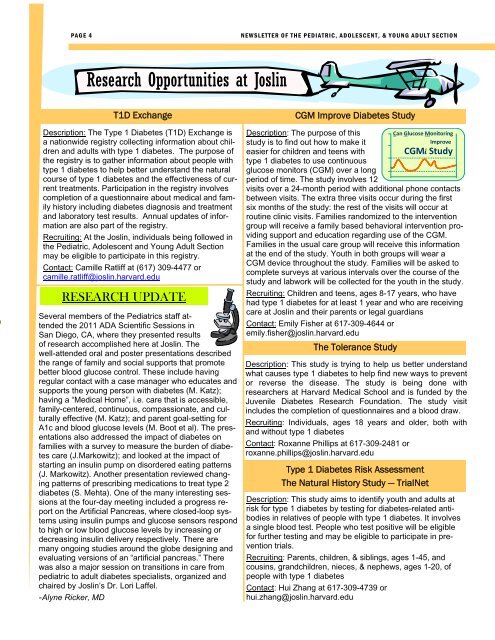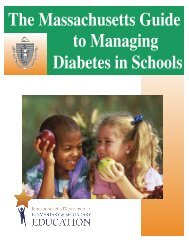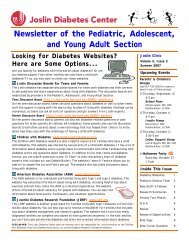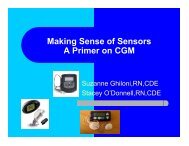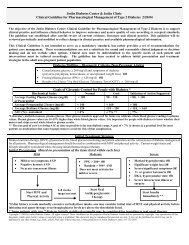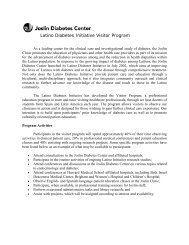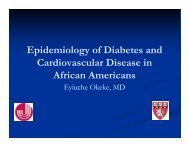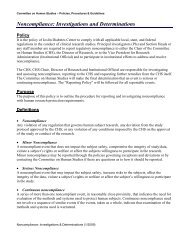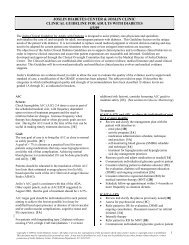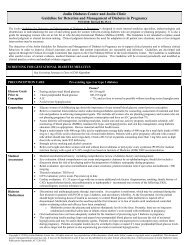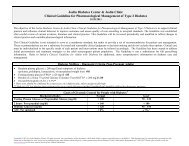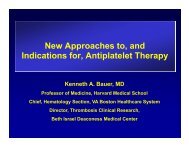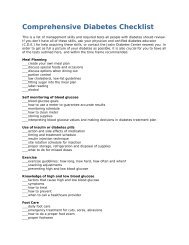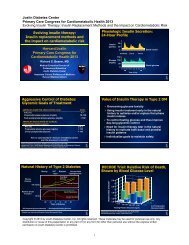the current newsletter as a .PDF - Joslin Diabetes Center
the current newsletter as a .PDF - Joslin Diabetes Center
the current newsletter as a .PDF - Joslin Diabetes Center
Create successful ePaper yourself
Turn your PDF publications into a flip-book with our unique Google optimized e-Paper software.
PAGE 4<br />
NEWSLETTER OF THE PEDIATRIC, ADOLESCENT, & YOUNG ADULT SECTION<br />
Research Opportunities at <strong>Joslin</strong><br />
T1D Exchange<br />
Description: The Type 1 <strong>Diabetes</strong> (T1D) Exchange is<br />
a nationwide registry collecting information about children<br />
and adults with type 1 diabetes. The purpose of<br />
<strong>the</strong> registry is to ga<strong>the</strong>r information about people with<br />
type 1 diabetes to help better understand <strong>the</strong> natural<br />
course of type 1 diabetes and <strong>the</strong> effectiveness of <strong>current</strong><br />
treatments. Participation in <strong>the</strong> registry involves<br />
completion of a questionnaire about medical and family<br />
history including diabetes diagnosis and treatment<br />
and laboratory test results. Annual updates of information<br />
are also part of <strong>the</strong> registry.<br />
Recruiting: At <strong>the</strong> <strong>Joslin</strong>, individuals being followed in<br />
<strong>the</strong> Pediatric, Adolescent and Young Adult Section<br />
may be eligible to participate in this registry.<br />
Contact: Camille Ratliff at (617) 309-4477 or<br />
camille.ratliff@joslin.harvard.edu<br />
RESEARCH UPDATE<br />
Several members of <strong>the</strong> Pediatrics staff attended<br />
<strong>the</strong> 2011 ADA Scientific Sessions in<br />
San Diego, CA, where <strong>the</strong>y presented results<br />
of research accomplished here at <strong>Joslin</strong>. The<br />
well-attended oral and poster presentations described<br />
<strong>the</strong> range of family and social supports that promote<br />
better blood glucose control. These include having<br />
regular contact with a c<strong>as</strong>e manager who educates and<br />
supports <strong>the</strong> young person with diabetes (M. Katz);<br />
having a “Medical Home”, i.e. care that is accessible,<br />
family-centered, continuous, comp<strong>as</strong>sionate, and culturally<br />
effective (M. Katz); and parent goal-setting for<br />
A1c and blood glucose levels (M. Boot et al). The presentations<br />
also addressed <strong>the</strong> impact of diabetes on<br />
families with a survey to me<strong>as</strong>ure <strong>the</strong> burden of diabetes<br />
care (J.Markowitz); and looked at <strong>the</strong> impact of<br />
starting an insulin pump on disordered eating patterns<br />
(J. Markowitz). Ano<strong>the</strong>r presentation reviewed changing<br />
patterns of prescribing medications to treat type 2<br />
diabetes (S. Mehta). One of <strong>the</strong> many interesting sessions<br />
at <strong>the</strong> four-day meeting included a progress report<br />
on <strong>the</strong> Artificial Pancre<strong>as</strong>, where closed-loop systems<br />
using insulin pumps and glucose sensors respond<br />
to high or low blood glucose levels by incre<strong>as</strong>ing or<br />
decre<strong>as</strong>ing insulin delivery respectively. There are<br />
many ongoing studies around <strong>the</strong> globe designing and<br />
evaluating versions of an “artificial pancre<strong>as</strong>.” There<br />
w<strong>as</strong> also a major session on transitions in care from<br />
pediatric to adult diabetes specialists, organized and<br />
chaired by <strong>Joslin</strong>’s Dr. Lori Laffel.<br />
-Alyne Ricker, MD<br />
CGM Improve <strong>Diabetes</strong> Study<br />
Description: The purpose of this<br />
study is to find out how to make it<br />
e<strong>as</strong>ier for children and teens with<br />
type 1 diabetes to use continuous<br />
glucose monitors (CGM) over a long<br />
period of time. The study involves 12<br />
visits over a 24-month period with additional phone contacts<br />
between visits. The extra three visits occur during <strong>the</strong> first<br />
six months of <strong>the</strong> study: <strong>the</strong> rest of <strong>the</strong> visits will occur at<br />
routine clinic visits. Families randomized to <strong>the</strong> intervention<br />
group will receive a family b<strong>as</strong>ed behavioral intervention providing<br />
support and education regarding use of <strong>the</strong> CGM.<br />
Families in <strong>the</strong> usual care group will receive this information<br />
at <strong>the</strong> end of <strong>the</strong> study. Youth in both groups will wear a<br />
CGM device throughout <strong>the</strong> study. Families will be <strong>as</strong>ked to<br />
complete surveys at various intervals over <strong>the</strong> course of <strong>the</strong><br />
study and labwork will be collected for <strong>the</strong> youth in <strong>the</strong> study.<br />
Recruiting: Children and teens, ages 8-17 years, who have<br />
had type 1 diabetes for at le<strong>as</strong>t 1 year and who are receiving<br />
care at <strong>Joslin</strong> and <strong>the</strong>ir parents or legal guardians<br />
Contact: Emily Fisher at 617-309-4644 or<br />
emily.fisher@joslin.harvard.edu<br />
The Tolerance Study<br />
Can Glucose Monitoring<br />
Improve<br />
CGMi Study<br />
Description: This study is trying to help us better understand<br />
what causes type 1 diabetes to help find new ways to prevent<br />
or reverse <strong>the</strong> dise<strong>as</strong>e. The study is being done with<br />
researchers at Harvard Medical School and is funded by <strong>the</strong><br />
Juvenile <strong>Diabetes</strong> Research Foundation. The study visit<br />
includes <strong>the</strong> completion of questionnaires and a blood draw.<br />
Recruiting: Individuals, ages 18 years and older, both with<br />
and without type 1 diabetes<br />
Contact: Roxanne Phillips at 617-309-2481 or<br />
roxanne.phillips@joslin.harvard.edu<br />
Type 1 <strong>Diabetes</strong> Risk Assessment<br />
The Natural History Study — TrialNet<br />
Description: This study aims to identify youth and adults at<br />
risk for type 1 diabetes by testing for diabetes-related antibodies<br />
in relatives of people with type 1 diabetes. It involves<br />
a single blood test. People who test positive will be eligible<br />
for fur<strong>the</strong>r testing and may be eligible to participate in prevention<br />
trials.<br />
Recruiting: Parents, children, & siblings, ages 1-45, and<br />
cousins, grandchildren, nieces, & nephews, ages 1-20, of<br />
people with type 1 diabetes<br />
Contact: Hui Zhang at 617-309-4739 or<br />
hui.zhang@joslin.harvard.edu


